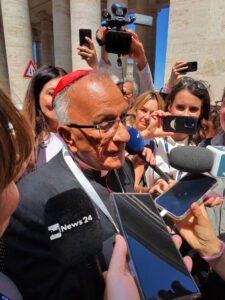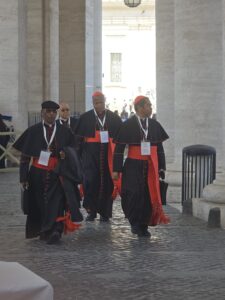ROME – With just four days to go until the conclave to elect a new pope begins, cardinals are addressing a variety of challenges the next pontiff will have to face, and are calling broadly for more clarity, but also continuity with Pope Francis.
Speaking to journalists after a May 2 general congregation meeting, Colombian Cardinal Jorge Enrique Jimenez Carvajal, 83, archbishop emeritus of Cartagena, said the church needs a pope who can speak to all corners of the world, “And help to bring a light of hope to so many people who are living such a difficult life.”
“Pope Francis marked the world and marked society,” he said, saying the next pope can come from anywhere, and that geography doesn’t matter.
Above all, “we ask God that he be the best possible. May he have a very big heart where everyone fits, all man, all women, all those who suffer,” he said, stressing the need for “More continuity than anything else.”
During that morning’s session, he said, a bishop had given a speech analyzing the word “continuity,” and how to understand the last three papacies – John Paul II, Benedict XVI, and Francis – with the “hermeneutics of continuity.”
“It was very interesting,” Carvajal said, saying continuity implies certain elements of the past “being born new and the new is being created…The church cultivates continuity,” he said.
While a certain level of tension in making the decision is normal, Carvajal said, polarization is a problem, because “The church is an institution that doesn’t go for polarization. In fact, it believes that polarization, ordinarily or almost always, is harmful.”
“What the church seeks is more is to promote unity…Unity must be built, and it is hard to build, because today it seems different, because there are different situations,” but that is the church’s task, he said.

Jimenez Carvajal, archbishop emeritus of Cartagena, speaks with journalists outside of the Vatican walls Friday, May 2, 2025. (Credit: Crux/Elise Ann Allen.)
Regardless of whatever decision is made and whoever gets elected, Carvajal said the cardinals are “unanimous” on the need to support the next pope.
Cardinals have now been meeting for eight days in pre-conclave general congregations, during which they are getting to know one another and offering interventions on the state of the world and the church, to establish a profile for the next Successor of Peter.
During the first general congregations, there was significant criticism of Pope Francis and his legacy among more conservatively minded members of the “old guard,” however, recent interventions have highlighted Francis’s emphasis on evangelization and synodality.
Vatican spokesman Matteo Bruni in regular daily press briefings has highlighted several topics being addressed during the general congregations, including the emphasis on evangelization, the need for the church to speak to younger generations, and the need for the Gospel to be preached effectively “from the parishes to the curia” in Rome.
The topics of financial and clerical abuse scandals have also been addressed as “wounds” that continue to afflict the church, and the need for more awareness so as to identify “concrete paths for its healing.”
One of the most glaring issues the new pope will have to face is the Vatican’s crippling deficit and its looming pension crisis. While Pope Francis took various measures to get on top of the problem, it is unresolved and remains one of the most immediate priorities for the incoming pontiff.
On Wednesday, April 30, several prelates gave presentations on the Vatican’s financial situation, with American Cardinal Kevin Farrell, chair of the Committee for Investments, speaking about its role and activities.
Austrian Cardinal Christoph Schönborn, chair of the Supervisory Commission of Cardinals of the Institute for the Works of Religion (IOR), the so-called Vatican Bank, spoke about its current situation, while Spanish Cardinal Fernando Vérgez Alzaga, president emeritus of the Governorate of Vatican City State, offered details on the Governorate, including some renovation works.
Polish Cardinal Konrad Krajewski, Apostolic Almoner, also spoke about the commitment of the Dicastery for the Service of Charity.
Other topics that have come up in discussions include liturgy, the importance of canon law, and the value of synodality, a buzzword of Francis’s papacy that implies a more collaborative style of leadership with an emphasis on making the church a more welcoming and inclusive place for all its members.
The connections between synodality, collegiality, and mission in the church were highlighted, as was the need to overcome secularism and to overcome polarization and divisions in society. The value of synodality in this regard was highlighted, “in close connection with episcopal collegiality, as an expression of differentiated co-responsibility,” Bruni said May 2.
References have also been made to documents of the Second Vatican Council, particularly the apostolic constitutions Lumen Gentium and Gaudium et Spes, and how to foster more priestly and religious vocations.
Numbers
Reaching a consensus for the new pope will be a challenge for the cardinals, as there are more of them – 135 electors participating, instead of the 115 and 117 of the past two conclaves – and they are on the whole far more diverse, with many being unfamiliar with Rome and unable to speak Italian.
Two electors, Cardinal Antonio Cañizares Llovera, archbishop emeritus of Valencia, and Cardinal John Njue, archbishop emeritus of Nairobi, Kenya, are unable to participate due to illness, meaning the number of electors present in Rome voting will be 133.

Carvajal in his comments to journalists noted that “many of us did not know each other” prior to coming to Rome for pre-conclave meetings, but he said the fact that there is so much diversity, and that they are now getting to know each other better, is gift for the church.
On the whole, the body of cardinals who will elect Francis’s successor is younger and more diverse, reflecting Pope Francis’s desire for a more global church that better reflected realities on the ground.
The average age of cardinal-electors, those under 80, is 70, however, there are several who are in their mid-40s and mid-50s, including Cardinal Mykola Bychok of Saints Peter and Paul of Melbourne (Ukrainian), who is 45; Cardinal Giorgio Marengo of Mongolia, 50; Américo Manuel Cardinal Alves Aguiar of Setubal, Portugal, 51; Indian Syro-Malabar Cardinal George Jacob Koovakad, prefect emeritus of interreligious dialogue, 51; and Lithuanian Cardinal Rolandas Cardinal Makrickas, coadjutor archpriest of St. Mary Major, 53.
Some 80 percent of the cardinal-electors were appointed by Pope Francis, more of whom come from the global south than in previous conclaves.
Whereas 51 percent of cardinal-electors came from Europe in 2005 and 2013, this year only 43 percent are from Europe, whereas the percentages of those from Latin America, Asia and the Pacific, and Africa and the Middle East have increased by several percentage points.
This year Latin Americans make up 18 percent of the cardinal-electors, whereas Asia and Pacific cardinals make up 16 percent, and cardinals from Africa and the Middle East represent 14 percent. North American cardinals, who made up 11 percent in the past two conclaves, are now nine percent.
With Francis’s appointees, there are now more voting cardinals from Asia and the Pacific than there are from Italy, which marks a significant departure from the past. There has also been a noticeable drop in cardinals from the curia, going from 27 percent in 2013 to just 20 percent now.
There are no serious contenders among the Americans, apart from Cardinal Robert Prevost, a Chicago native who spent nearly 30 years as a missionary in Peru with his Augustinian order, as he is considered moderate, while the others are viewed as being either too far to the right, or too far to the left.
Weighing in on the profile of the next pope, Italian Cardinal Camillo Ruini, 94, vicar emeritus of Rome, in an open letter to cardinals ahead of the conclave said Francis’s papacy is something “that questions and deeply shakes the church.”
A conservative giant, Ruini said he hoped the church of the future would be charitable, but “doctrinally secure, governed according to the law, deeply united within itself.”
He insisted on the need for “certainty of truth and the security of doctrine,” but lamented that Benedict XVI’s papacy was “undermined by his poor aptitude for governing.”
“This is a concern that applies to all times, including the near future,” he said, and stressed the need to overcome both internal and external threats to the church’s unity.
Likewise, conservative German Cardinal Gerhard Ludwig Müller told Italian newspaper La Reppublica that there was “unanimous appreciation” for Pope Francis’s attention to migrants, the poor, and to overcoming disparities between “the center and the periphery.”
However, he said Francis was “too ambiguous” at times, whereas Benedict XVI offered “perfect theological clarity.”
“Everyone has their own charisms and abilities and I think Pope Francis had them more in the social dimension,” he said, voicing his belief that the next pope should provide clarity on Pope Francis’s authorization for blessings of individuals in same-sex unions, as well as his choice to appoint a woman prefect to the Dicastery for Religious, as it is an “ecclesial body” and not an administrative role.
He also underlined the need to draw a firmer line in dialogue with Islam and with China going forward, not allowing for a “relativistic” attitude toward violent instincts in Islam, and being firm in now allowing “that communists appoint bishops.”
German Cardinal Walter Kasper, 92, also gave an interview to La Reppublica in which he praised Pope Francis’s commitment to synodality and said it ought to be a guide for the future.
“I don’t think we can go back, it would be senseless. I think that we can move forward, even with a new pope,” he said, saying the faithful themselves “voted with their feet” in terms of what they want in a pope when they turned out in droves for Francis’s funeral, which was attended by around 200,000.
Kasper voiced his conviction that the church will “move forward in the footsteps of Pope Francis. This is his central message: Jesus Christ preached mercy, he lived mercy, and he died for us on the cross out of mercy, and therefore mercy is so central to the faith of the church.”
“I hope that [the cardinals] will reach a consensus very soon on the next pope, in the footsteps of Francis,” he said.
Four cardinal-electors still need to arrive to Rome prior to the start of the conclave May 7, which will begin with Mass and the swearing of the oath of secrecy that morning, and the closing of the Sistine Chapel doors and casting the first vote that evening.
The chimney that black or white smoke will pour out of after the various ballots has already been installed, and the Sistine Chapel itself is being prepared with a special floor, and tables and chairs for the voting sessions.
After the first vote Wednesday, two votes will take place each morning and each afternoon until a new pope is elected.
Follow Elise Ann Allen on X: @eliseannallen














